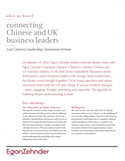Connecting Chinese and UK business leaders
21st Century Leadership Discussion Forum
On January 19, 2015, Egon Zehnder hosted a private dinner event with Egon Zehnder Chairman Damien O’Brien to connect Chinese and UK business leaders. As the first of our roundtable discussion series dedicated to senior business leaders with strong China connections, the dinner event brought together CEOs, board members and senior executives from both the UK and China. It was an excellent dialogue – open, engaging, thought provoking and enjoyable. The appetite for building deeper understanding is clear.
Key takeaways
The rising power of Chinese businesses
Our guests touched on the rising economic and political power of China and its related influence on the Western world. The question raised was whether China/Chinese businesses will choose to adapt to the international (business) world, and whether they will opt to merge or reshape their existing structures. The generally accepted view was that the most productive and likely outcome will be a fusion between China and the Western world, although this probably will require adaptation from both sides.
Building trust
The view in the room was that lack of cultural awareness often acts as a barrier to the building of cross-border relationships. Therefore, the drive by governments and businesses to enhance cultural understanding on both sides is a positive step toward cooperation. It also should be noted that our guests showed their appreciation to Egon Zehnder for facilitating connections between the two business communities.
China going global
China now is at a stage of large-scale outward investment. There are an increasing number of Chinese companies operating abroad. They are at an early stage of learning how to overcome new issues associated with internationalisation:
1. Model for success is being challenged: Often in Chinese companies, the top 10-20 senior executives make all the decisions, with the rest of the team focusing on execution. This, coupled with a strong drive for success, frequently has been the formula for building successful businesses with scale. However, this formula poses future challenges as companies continue to grow and expand their international footprint.
2. Headquarters support is lagging behind: The lack of understanding on the part of Chinese senior business leadership about foreign business environments makes foreign- country managing directors’ jobs much more challenging than those of their peers in their home territory.
3. Difficulties found in building cross-cultural management teams:Differences in culture and management approaches challenge the integration of international talent into Chinese management teams.
International businesses in China
One of the key challenges of conducting international business in China is to identify and select the leaders who understand the local conditions. Such individuals are scarce, which can be an impediment to the growth of international businesses in China:
1. Complex demography: Rapid demographic, economic and social development has led to a growing young population with a different outlook vs. their elders. One of our guests described it as “a new generation every five years”. This complexity is reflected in consumer behaviour, ways of conducting business and employee motivation.
2. Misleading perceptions: China often is perceived as being homogenous. The reality is much more varied, with strong regional differences due to the sheer scale of the country. It is further complicated by the demographic complexity described above. In addition, there are major dissimilarities between a state-owned company and an entrepreneurial business, which is the dominant form of local ownership in the country. As a result, generalisation is misleading. If businesses are to operate in China successfully, they will need to appreciate and navigate this complexity.
3. Different management style: We spent some time sharing Egon Zehnder’s proprietary Competency Model and our observations through global Management Assessment work using this framework. The comparison shows that senior executives in more developed markets tend to be more rounded in a range of competencies, whereas Chinese senior executives tend to have a high spike on Results Orientation. Successful executives in developed markets do not always succeed in China.
4. Scarcity of local talent: Local business professionals in their late 30s to mid-40s are viewed as the “sweet spot” when it comes to leadership talent. An increasing number of potentials from this age group are being trained by companies in China and abroad, but this still is a limited pool. Such individuals also are sought after by Chinese companies, which now can offer global roles based in China.
Private equity firms in China
Private equity (PE) firms are active in China with mixed success. The successful ones often buy a family-owned business when the first-generation leader, approaching retirement age, fails to find an internal successor. A PE firm comes in at this point and strengthens the management team to sustain/improve performance. Just as important, a non-executive/advisory board is set up to establish governance. When the business is on track with both improved business performance and structured governance, the PE firm would exit by selling to a more organised international company that is looking to expand into China through acquisition. Such companies are wary of buying a traditional family-owned business, which can be difficult to evaluate.






